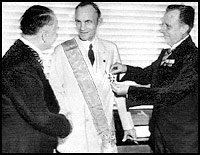The Oskars
“I've always said everyone needs a good stiff Oskar in their hands”
“Thanks for the award, sugar tits”
The Nazi Germany Annual Academy Awards, or Oskars as they are popularly known, were held from 1933 to 1945, usually in the month of March. The awards showcased and awarded the best in anti-Semitic and pro-Nazi cinema. The awards were held each year on the Zeppelinfeld in Nuremberg.
Voting is undertaken by members elected to the Reichstag and leading industrialists. These were known as the Reich Academy Of Motion Picture Arts and Sciences. No actors or film industry officials were invited to partake as party policy dictated that only party members should be allowed to vote, in order to provide fair and impartial elections. This was the famous German Actors' Guild Order.
Categories[edit | edit source]
There were five major categories of awards presented by the Academy at each show.
Note, other awards for technical aspects and production of films were excluded from the main show on grounds that they wasted time, effort and including everyone who helped on a movie is somewhat akin to Communism.
- Best Actor In A Leading Role: The most famous recipient of this was Adolf Hitler who won the Award in 1937 for his role in the propaganda documentary The Triumph of The Will. Indeed Hitler won the award on 4 different occasions, making him the most successful actor in Oskars history.
- Best Director: Although the Academy had forbidden a Best Actress category, the female film director Leni Riefenstahl holds the most wins in this category (five, just ahead of Dr. Paul Joseph Göbbels with four).
- Best Film Soundtrack: Every year, invariably won by Wagner, indeed the show's theme tune was the much cliched Nazi power ballad Ride of The Valkyries.
- The Henry Ford Lifetime Achievement Award for Outstanding Contribution to Anti-semitism: Awarded to Ford at the inaugural show in 1933. Notable other winners include Mel Gibson, Walt Disney and Joseph Stalin(in absentia in 1939)
- Best Film: Some of the twelve films to be honoured with this award were: The Triumph Of The Will; The Passion of The Christ; The Eternal Jew; Mein Kampf: The Movie and the edited version of Shindler's List wherein all references to Oscar Schindler's saving Jews from the concentration camps was erased. Otherwise it was just fine.
This category was subject to controversy in 1936 all five nominations for Best Film were decidedly homoerotic and/or paedophillic recruitment films for the Wehrmacht and the Hitler Youth. Officials became suspicious and arrested several members of the Academy, who were promptly executed. It was decided to press ahead with the award presentation regardless- because, as a Party memo cites: "It is not like anyone would notice all the homoeroticism anyway." The award that year went to Come and Ride for The Fatherland, a short recruitment film containing ranks of blue-eyed, blonde-haired young men.
Hosts[edit | edit source]
The most prestigious showbiz gig in the whole of the Third Reich was to host the Oskars. The finest comedians and entertainers presented the annual cinematic extravaganza from the first host, Joseph Goebels(1933) to Charles Lindberg(1936) and Jon Stewart(1940). When Joseph Goebels hosted the innaugural Oskars in 1933, his audience banter and general rat-like demenour was criticised in several German newspapers (which were promptly shut down and its editors, their families and any mentally retarded friends they may have had, all sent to the death camps). However it was decided that it was best to rotate the host's position every year.
While Adolf Hitler never hosted the show himself he would issue a yearly telecast for the Oskars, congratulating those who won and warning unsuccessful nominees that continued inefficiency would not be tolerated. In 1942 the Fuhrer did present an individual award, the Henry Ford Lifetime Achievement Award for outstanding contribution to Anti-semitism, to Mel Gibson.
In Memoriam[edit | edit source]
The award ceremony would broadcast a montage every year of Those We Have Lost In The Past Year. This number was relatively few in the early 30's, however, by 1945, the broadcast lasted thirty seven hours, with thirty five of those hours dedicated to this particular segment.
Following the Night of the Long Knives in June 1934, the following year's telecast was subject to much controversy as it contained a short memorial piece on Ernst Rohm, the assassinated leader of the SA and renowned homosexual. Many influential party members argued that the main impotus of the Nazi Academy Awards was to counteract the disproportionate influence of not only the Jews but also homosexuals in the motion picture industry.


